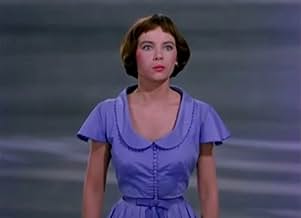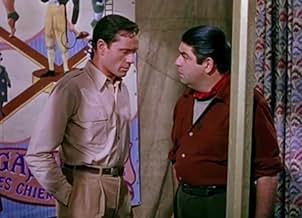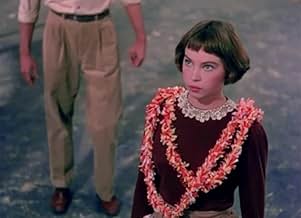CALIFICACIÓN DE IMDb
7.2/10
4.2 k
TU CALIFICACIÓN
Una joven huérfana se convierte en parte de un acto de títeres.Una joven huérfana se convierte en parte de un acto de títeres.Una joven huérfana se convierte en parte de un acto de títeres.
- Dirección
- Guionistas
- Elenco
- Ganó 1 premio Óscar
- 7 premios ganados y 9 nominaciones en total
Jean-Pierre Aumont
- Marc
- (as Jean Pierre Aumont)
Jane Adrian
- Nautch Dancer
- (sin créditos)
Nick Borgani
- Carnival Patron
- (sin créditos)
Gene Conklin
- Whistler in Ballet Sequence
- (sin créditos)
Paul Cristo
- Carnival Patron
- (sin créditos)
George Davis
- Workman
- (sin créditos)
Jeannine Ducasse
- French Girl
- (sin créditos)
Bess Flowers
- Carnival Patron
- (sin créditos)
Richard Grayson
- Flirting Vendor
- (sin créditos)
- Dirección
- Guionistas
- Todo el elenco y el equipo
- Producción, taquilla y más en IMDbPro
Opiniones destacadas
10billy-7
First of all, to correct a comment made by at least one person here, the movie came before the stage musical "Carnival." Second, the movie is far superior to the stage musical. True, it's short. So? True, there's just one song. But the one song, "Hi-Lili Hi-Lo," is better than anything in "Carnival." So much for comparisons. The movie absolutely defines movie magic. It creates an unforgettable world with an unforgettable heroine played with genius by the great Leslie Caron in a performance nominated for an Oscar and deserving of a win (she was beaten by the charming but less-inspired Audrey Hepburn). Anyone who passes up the chance to see "Lili" is denying themselves one of the prime treats in all of cinema. I've seen it countless times and never fail to laugh and cry. But where is the DVD??? Give, already!
This is one of my favorite films. It is so delightfully simple. Leslie Caron does a marvelous job of making us believe she is an awkward 16 year old in love with a magician. I can't explain exactly why I love this film--perhaps I'm a sucker for all in-love-with-someone-who's-in-love-with-someone-else stories, or maybe I have a soft spot for puppets. But this film warms me to the heart and I recommend it to all but the heart hearted cynic.
"Lili" is one of the sweetest, most enchanting musicals Hollywood has ever produced. Not that most of the Hollywood musicals are ever realistic, but this particular story is more of a fable than an imitation of life. The character of Mel Ferrer is reminiscent of the Beast in "the Beauty and the Beast", a tortured soul aching for love, and as any girl worth her salt would know, tortured souls make the best kind of heroes!
The two dance/fantasy sequences are charming, especially the latter one, where Lili grows from an awkward, love-sick child into a woman of character and determination, all in a few steps of waltz. Oh, and the puppets are totally adorable!!
The two dance/fantasy sequences are charming, especially the latter one, where Lili grows from an awkward, love-sick child into a woman of character and determination, all in a few steps of waltz. Oh, and the puppets are totally adorable!!
10eadoe
Of all the popular overblown, oversexed "coming of age" movies (mostly about male coming of age - starting with "The Summer of '42"), none has the honesty and truth of "Lili". Why? Because coming of age has less to do with sex (as most men think) than it has to do with an awareness of evil. The most telling line in the film is spoken by Paul's partner, who chides Paul for slapping Lili and says, "She is realizing that there is cruelty in the world, and she is learning to protect herself from it." Like Eve in the Garden of Eden, Lili's loss of innocence comes with her knowledge of evil, not her loss of virginity.
And unlike other coming of age movies that have the young actors tossing around "cute" sexual comments that don't ring true for a callow young person (because they were obviously scripted by a jaded 50-year-old male), "Lili" rings true with every note (as Paul says, "She's like a little bell that gives off a pure sound every time you strike it."). Her naivety is far more true to form -- when she is warned by one of the puppets that the lecherous puppet Renaldo "is a wolf", the innocent Lili replies, "I thought he was a fox." This is exactly the way a kid would really respond -- not "getting" the sexual reference and thinking that the comment was about the species of the animal.
I understand Audrey Hepburn beat out Leslie Caron for the Oscar that year with her amateurish performance in "Roman Holiday" -- what a travesty that was, since Audrey's performance had none of the depth and exquisite vulnerability of Leslie's performance in "Lili".
And unlike other coming of age movies that have the young actors tossing around "cute" sexual comments that don't ring true for a callow young person (because they were obviously scripted by a jaded 50-year-old male), "Lili" rings true with every note (as Paul says, "She's like a little bell that gives off a pure sound every time you strike it."). Her naivety is far more true to form -- when she is warned by one of the puppets that the lecherous puppet Renaldo "is a wolf", the innocent Lili replies, "I thought he was a fox." This is exactly the way a kid would really respond -- not "getting" the sexual reference and thinking that the comment was about the species of the animal.
I understand Audrey Hepburn beat out Leslie Caron for the Oscar that year with her amateurish performance in "Roman Holiday" -- what a travesty that was, since Audrey's performance had none of the depth and exquisite vulnerability of Leslie's performance in "Lili".
LILI, the 1953 film starring Leslie Caron in the title role, is one of the first examples of a screenplay being turned into a stage musical (CARNIVAL). Though it is common these days for Broadway to find inspiration in film sources, it was highly unusual at the time. It began life as a short story, with inspiration from the KOOKLA, FRAN AND OLLIE television program. Later made into a dark and unusual novella of sexual awakening, the tale was then adapted for the screen as LILI, a film which became the sleeper hit of 1953, eventually running in the same New York City theatre for almost 2 years. It's one, beautifully utilized song, "Hi Lili, Hi Lo" was an enormous hit and contributed to LILI's popularity.
The story, concerning the sexual and emotional coming of age of a young French girl, is unusual for its Freudian overtones and stark emotional mood. When young Lili (Leslie Caron in a gorgeously crafted and heartbreaking performance) comes to a small French village, looking for a family friend, she is devastated to learn that he has died. Without friends or family, she begs a job from a local merchant who sees her desperation as a sexual opportunity. When the merchant tries to rape Lili, she is saved by Marc, the handsome magician of a traveling carnival (Jean-Pierre Aumont). On Marc she foists all of her adult and childhood needs, her bursting sexuality along with her need to be cared for and loved. Eventually she begins working with the carnival but proves a terrible disappointment as a waitress in the carnival cafe. Lonely and desperate, she attempts to kill herself but is saved once again; this time by Paul the carnival puppeteer (a dashing Mel Ferrer in a fine performance) who speaks to her through his puppets, kindly Carrot Top, vain Marguerite, wily Reynaldo the Fox and innocent Horrible Henry the Giant. Paul, a former dancer, crippled years earlier in an accident, is full of anger and resentment but takes pity on Lili, who is so charmed by the puppets that, like a child, she forgets his presence.
The film explores their turbulent relationship as Lili becomes the star of the Carnival, charming patrons with an uncanny ability to speak to the puppets as if they are real. Complications arise as Paul begins to realize his own affection for Lili, while Lili continues to be infatuated with the magician, who's assistant (Zsa Zsa Gabor) is his wife.
With fine performances all around and an unusual atmosphere, the film has something of a cult following and is highly regarded for its frank and emotional nature. With its full-color cinematography, adorable puppets and carnival setting, this film might be mistaken for a children's story but deals, rather, with powerful adult themes. LILI may seem tame by today's standards, but given the conservativism of the 1950's as well as the strict production code in force at the time, LILI is rather shocking.
There is a very unusual dream sequence late in the movie which attempts to explore certain aspects of Lili's psyche through dance. This sequence is not entirely successful, but manages to get its point across and leads directly to the film's moving final moment. It's subtle treatment of a difficult subject is inspiring. The loss of innocence, the retreat from childhood and the desperate need for someone to love prove compelling subjects in a film that is, though imperfect, haunting.
The story, concerning the sexual and emotional coming of age of a young French girl, is unusual for its Freudian overtones and stark emotional mood. When young Lili (Leslie Caron in a gorgeously crafted and heartbreaking performance) comes to a small French village, looking for a family friend, she is devastated to learn that he has died. Without friends or family, she begs a job from a local merchant who sees her desperation as a sexual opportunity. When the merchant tries to rape Lili, she is saved by Marc, the handsome magician of a traveling carnival (Jean-Pierre Aumont). On Marc she foists all of her adult and childhood needs, her bursting sexuality along with her need to be cared for and loved. Eventually she begins working with the carnival but proves a terrible disappointment as a waitress in the carnival cafe. Lonely and desperate, she attempts to kill herself but is saved once again; this time by Paul the carnival puppeteer (a dashing Mel Ferrer in a fine performance) who speaks to her through his puppets, kindly Carrot Top, vain Marguerite, wily Reynaldo the Fox and innocent Horrible Henry the Giant. Paul, a former dancer, crippled years earlier in an accident, is full of anger and resentment but takes pity on Lili, who is so charmed by the puppets that, like a child, she forgets his presence.
The film explores their turbulent relationship as Lili becomes the star of the Carnival, charming patrons with an uncanny ability to speak to the puppets as if they are real. Complications arise as Paul begins to realize his own affection for Lili, while Lili continues to be infatuated with the magician, who's assistant (Zsa Zsa Gabor) is his wife.
With fine performances all around and an unusual atmosphere, the film has something of a cult following and is highly regarded for its frank and emotional nature. With its full-color cinematography, adorable puppets and carnival setting, this film might be mistaken for a children's story but deals, rather, with powerful adult themes. LILI may seem tame by today's standards, but given the conservativism of the 1950's as well as the strict production code in force at the time, LILI is rather shocking.
There is a very unusual dream sequence late in the movie which attempts to explore certain aspects of Lili's psyche through dance. This sequence is not entirely successful, but manages to get its point across and leads directly to the film's moving final moment. It's subtle treatment of a difficult subject is inspiring. The loss of innocence, the retreat from childhood and the desperate need for someone to love prove compelling subjects in a film that is, though imperfect, haunting.
¿Sabías que…?
- TriviaThis film was based on The Saturday Evening Post's Paul Gallico's short story "The Man Who Hated People", published in the 28 October 1950 edition, which was inspired by the children's puppet show Kukla, Fran and Ollie (1947). Due to the success of the film, Gallico expanded the story into a novella.
- ErroresWhen Marc plays a magic trick with his cigarette at the notions store, he actually burns Lili's hand, right before playing the trick. Lili jerks her hand apart, but she keeps on watching Marc as if nothing has happened.
- Citas
Lili Daurier: We don't learn. We just get older, and we know.
- ConexionesEdited into Off to See the Wizard: Lili: Part 1 (1967)
- Bandas sonorasHi-Lili, Hi-Lo
Music by Bronislau Kaper
Lyrics by Helen Deutsch
Performed by Leslie Caron and Mel Ferrer
Selecciones populares
Inicia sesión para calificar y agrega a la lista de videos para obtener recomendaciones personalizadas
- How long is Lili?Con tecnología de Alexa
Detalles
Taquilla
- Presupuesto
- USD 1,353,000 (estimado)
- Tiempo de ejecución1 hora 21 minutos
- Color
- Relación de aspecto
- 1.37 : 1
Contribuir a esta página
Sugiere una edición o agrega el contenido que falta

Principales brechas de datos
By what name was Lili (1953) officially released in India in English?
Responda

































